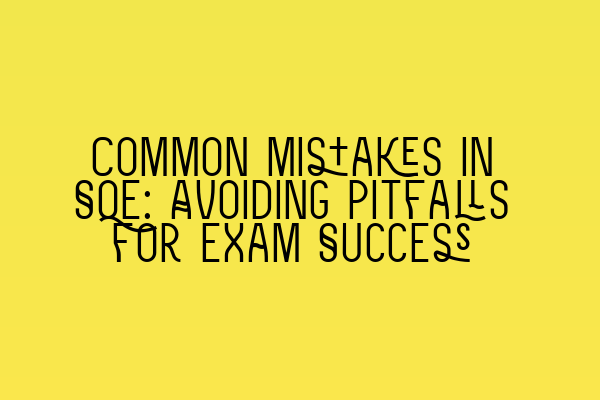Common Mistakes in SQE: Avoiding Pitfalls for Exam Success
Preparing for the Solicitors Qualifying Examination (SQE) can be a challenging task. It requires a deep understanding of the law, critical thinking skills, and the ability to apply legal principles to practical scenarios. As you embark on your journey to SQE success, it is crucial to be aware of common mistakes that candidates often make, so you can avoid these pitfalls and maximize your chances of achieving a stellar performance.
Lack of Exam Analysis
One of the biggest mistakes candidates make is neglecting to analyze their performance in mock exams or practice questions. SQE Mock Debrief Sessions are invaluable opportunities to assess your strengths and weaknesses, identify areas for improvement, and fine-tune your study strategy. Make sure to take advantage of these sessions to gain insights into your performance and enhance your exam readiness. To learn more about the importance of mock debrief sessions, check out our article on SQE Mock Debrief Sessions: Analyzing Your Performance for Growth.
Insufficient Understanding of the SQE
Before diving into your preparation, it is essential to have a comprehensive understanding of what the SQE entails. Familiarize yourself with the exam structure, content areas, and assessment methods. Our article on Unveiling the Solicitors Qualifying Examination (SQE): What You Need to Know provides an in-depth overview of the SQE, ensuring you have all the necessary information at your fingertips. This understanding will guide your study plan and help you focus on the right areas.
Failure to Seek Guidance
Studying for the SQE can be overwhelming, especially if you are navigating it on your own. Seek guidance from experienced professionals or SQE tutors who can provide expert advice and support tailored to your needs. They can offer valuable insights, clarify complex legal concepts, and provide guidance on exam techniques. Additionally, our article on Tips for SQE Success: Key Pointers for a Stellar Performance offers key tips to help you excel in your preparation.
Inadequate Utilization of Prep Resources
Preparing for the SQE requires access to comprehensive study materials and resources. However, candidates often struggle with identifying the most relevant and effective resources. Our article on Comprehensive SQE Prep Resources: Your Key to Exam Readiness provides a curated list of resources that cover all the requisite areas of the exam. By utilizing these resources, you can ensure you have a well-rounded and thorough preparation.
Lack of Realistic Practice
One of the most common mistakes candidates make is not engaging in enough practice with realistic and timed SQE mock exams. These practice exams simulate the actual exam conditions, allowing you to familiarize yourself with the format, time constraints, and types of questions. They also provide an opportunity to identify any gaps in your knowledge and improve your time management skills. To maximize your preparation, consider our article on SQE Mocks Unleashed: Maximizing Your Preparation with Realistic Practice for tips on using mock exams effectively.
Poor Time Management
The SQE is a time-sensitive exam that requires candidates to efficiently manage their time. Poor time management can lead to rushed answers, incomplete responses, and a failure to cover all required areas. Practice timed exercises, create study schedules, and learn to prioritize tasks effectively to optimize your time management skills.
Failure to Review and Revise
Consistent revision and review of the material you have covered is essential for long-term retention and understanding. Failing to review regularly can lead to a loss of knowledge and difficulty in recalling information during the exam. Create a revision plan that allows for regular review of the topics covered, ensuring you retain the information for the exam day.
Avoiding these common mistakes can significantly increase your chances of success in the SQE. Take the time to analyze your performance, seek guidance, utilize comprehensive resources, engage in realistic practice, manage your time effectively, and prioritize regular revision. By doing so, you will be well-prepared to tackle the SQE with confidence and achieve the results you desire.

Leave a Reply